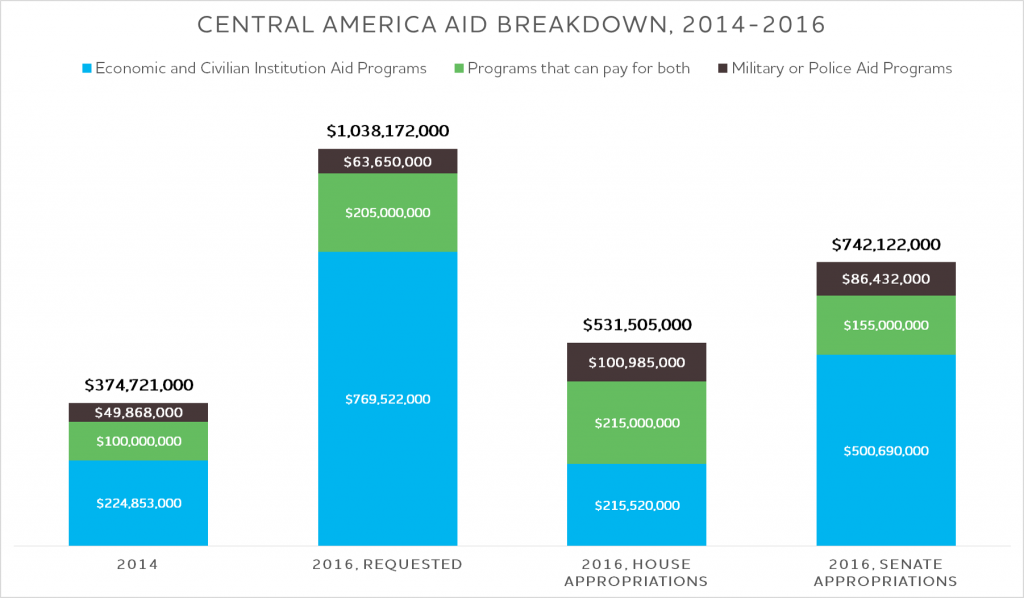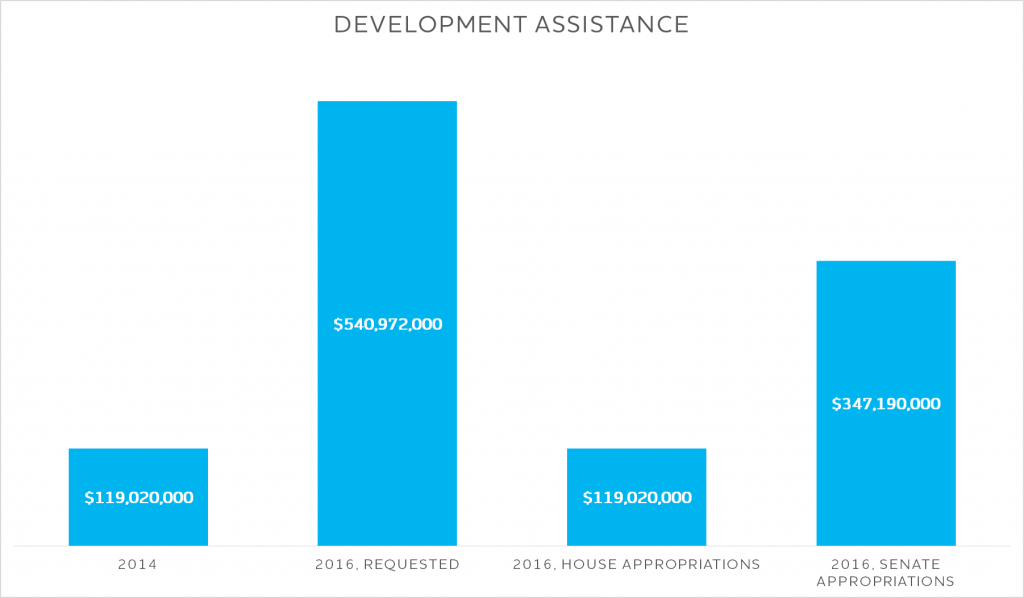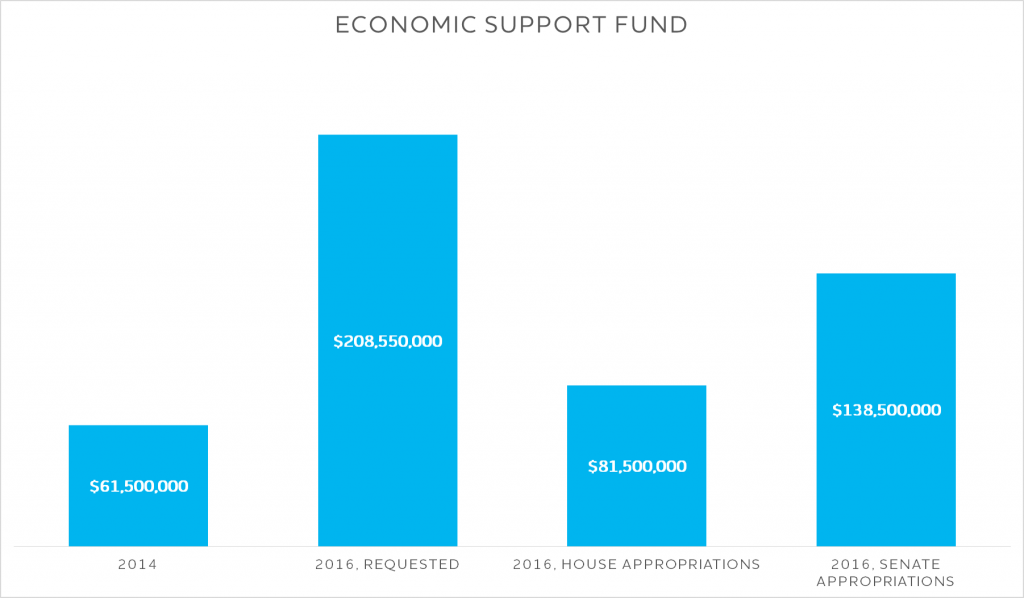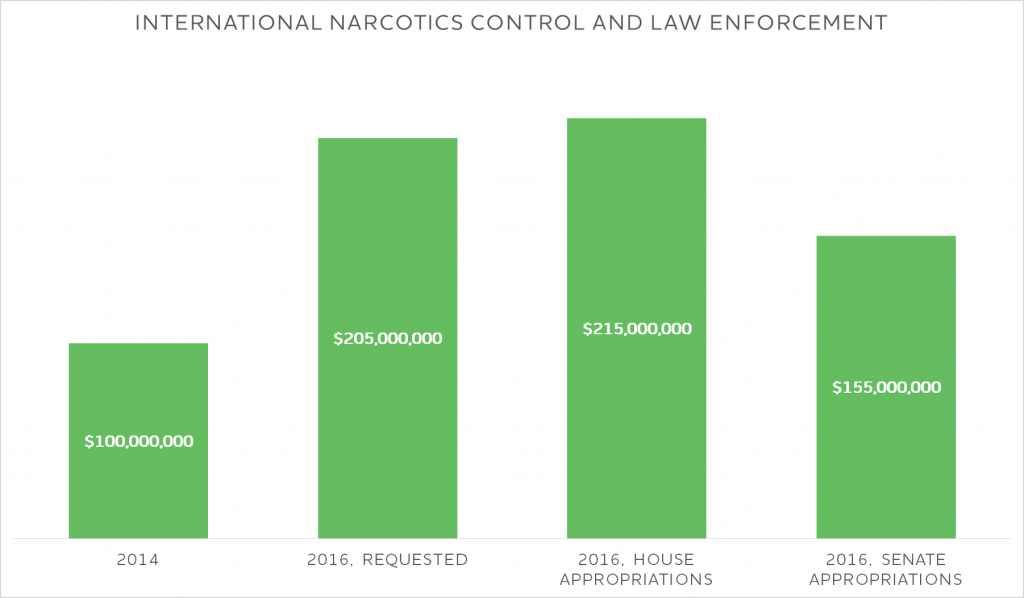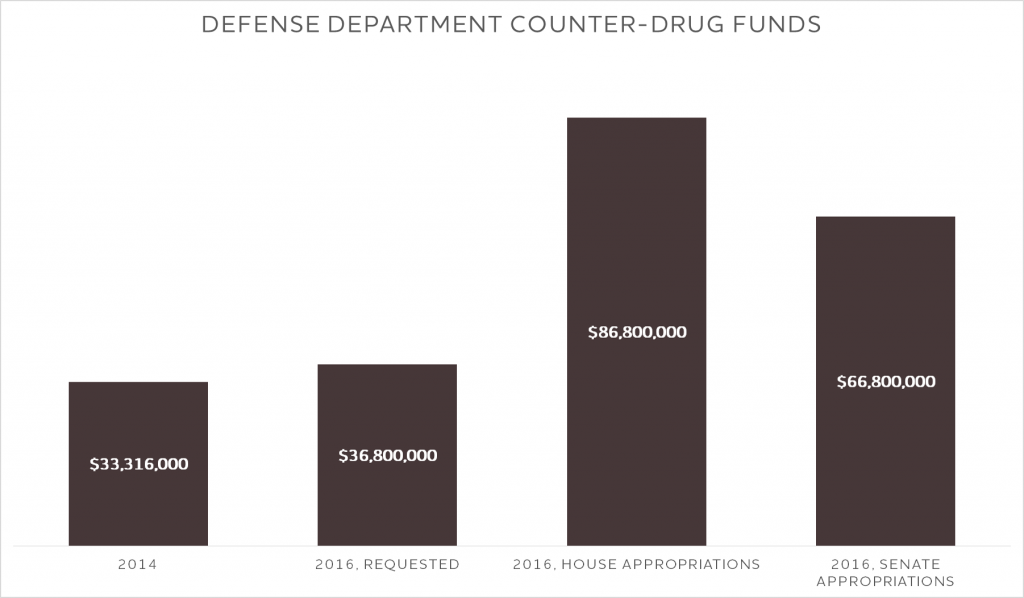Last February, the Obama administration requested US$1 billion in 2016 assistance for Central America as part of next year’s foreign aid budget proposal. Unsurprisingly, the Republican-dominated Congress has cut back on the administration’s request, with the Senate offering about two-thirds of the total and the House of Representatives offering less than half.
The proposed package would have tripled assistance to Central America, a response to the swell of unaccompanied minors and families who arrived at the U.S. border in 2014, fleeing record levels of violence, high rates of poverty, and weak and corrupt institutions in the “Northern Triangle” countries of El Salvador, Guatemala, and Honduras.
As a February WOLA overview explained, the request appeared to be a big improvement over previous packages as “at least 80 percent—[went] to civilian institutions, civil society, and economic development, in recognition of the need to address the root causes underlying the violence and lack of opportunity driving migration,” while a notable portion of the remaining security-force assistance was destined for programs to reform police forces charged with protecting citizens. Past big-ticket aid packages to Latin America have poured more resources into drug interdiction and security forces than economic development and institution-building. While the details of the request have to be examined, the broad outlines appeared to be moving in the right direction.
Congress is now finalizing its Central America assistance. The latest foreign aid bills from the House and Senate provide modest boosts in economic and development aid, although are substantially less than what the Administration requested. At the same time, they increase funding levels for a range of programs related to drug interdiction and border security. Of the $1 billion requested, the Senate bill would provide $675.3 million, and we estimate the House would provide $449.7 million. Another bill would raise proposed Defense Department funding for military assistance to the region beyond the administration’s request.
Although the Senate bill’s economic and development aid increases fall short of the administration’s request, it provides much stronger conditionality pushing for anti-corruption measures, institutional and legal reforms, budget oversight, and human rights, while directing a much larger share of its proposed funds to development than the House version.
Lawmakers are currently in the final stages of negotiating language and amounts for a final aid package — the vote for the bill designating State Department assistance must take place by December 11, and President Obama is expected to sign a revised version of the defense bill after vetoing the last bill. Altogether, this is how the administration’s request and current congressional bills compare to assistance to Central America in fiscal year 2014, the last year for which we have solid numbers:
Both the House and the Senate more or less acceded to the request for smaller programs such as Global Health, International Military Education and Training, Foreign Military Financing and Nonproliferation, Anti-Terrorism, Demining, and Related Programs. But there were some substantial changes to the larger foreign assistance programs:
While both bills cut funding for Development Assistance (DA) relative to the administration’s proposal, the House reduced the request significantly more than the Senate. Administered by USAID, DA in Central America would, as we wrote in February, “prioritize trade promotion aid, energy development, literacy and vocational education, job programs for at-risk youth, and improvements to governments’ provision of basic services.” The White House request had sought to give this program the largest increase, accounting for nearly half of the billion-dollar proposal.
Going by the Senate bill, it appears Guatemala would receive the biggest portion of DA funds. While the House did not explicitly assign DA funds for Central America, it plans to maintain global DA funding levels from 2014. Due to the lack of specificity, we estimate House DA money for Central America will also remain at the same 2014 level.
Money for the Economic Support Fund has also been sliced from the president’s ask, with the House granting just $81.5 million of the $208.5 million requested and the Senate offering $138.5 million. According to the White House, these funds would provide support to strengthen civil society, crime and violence prevention programs, and to “improve management of public funds; strengthen rule-of-law institutions to better administer justice, ensure due process, and protect human rights; and… increase local resilience to issues that can contribute to migration, especially stresses on rural agriculture.”
International Narcotics Control and Law Enforcement (INCLE) funds can be used by the State Department for a wide variety of purposes, though they are chiefly oriented toward drugs and law enforcement programs. The State Department sometimes redirects some of the funds to economic development, and under the rubric of anti-narcotics and law enforcement can fund a range of activities, from helicopters to the U.S. contribution to the International Commission Against Impunity in Guatemala (Comisión Internacional contra la Impunidad en Guatemala, CICIG).
In February, the White House noted that INCLE funds would emphasize support for civil society, human rights, and programs addressing the “lack of opportunity driving increased migration.” While the Senate did not specify how its $155 million in INCLE funds would be spent, the House provides $10 million over the administration’s requested $205 million, and called for programs that “support border security, counter the activities of criminal gangs, drug traffickers and organized crime, and combat human smuggling and trafficking.”
The additional funds were allocated to target human trafficking and bolster maritime and border security, particularly along Mexico’s borders with Guatemala and Belize. The Senate cut about $50 million, or about one quarter of the request.
Beyond the foreign aid bill, Congress has moved to nearly double funding for military assistance through the Defense Department’s counter-drug budget. Through these accounts, which appear in the annual Defense authorization and appropriations bills, US$33.8 million went to Central America in 2013 and US$33.3 million in 2014. In the first half of 2015 (January to June), the Pentagon provided US$4.3million (most deliveries tend to happen during the latter part of the year).
The White House request sought US$36.8 million in Defense Department funds for Central American security forces: a slight increase that did not appear in the administration’s memos to Congress. The latest defense bill from Congress, which President Obama is expected to sign, requested $66.8 million for counter-narcotics aid, designating an extra $30 million for Central America for “DoD-unique capabilities in areas such as aerial and maritime capabilities, building partnership capacity, and the detection and monitoring of illicit trafficking.” Another $20 million from this budget would go for Intelligence Surveillance and Reconnaissance to help detect and monitor trafficking, particularly drug flights, in or near Central American territory.
The $30 million in aid will pay for things like training, intelligence, equipment, construction at military and police bases, and task forces, such as “Tecún Umán” and “Chortí,” operating along Guatemala’s borders with Mexico and Honduras, as well as “Xinca,” to be stationed on the El Salvador-Guatemala border.
Aside from the money, other differences
All of the Senate’s proposed budget for Central America (excluding the anti-drug funds for the Pentagon) is in support of the Alliance for Prosperity, a proposal put forth in June by the presidents of El Salvador, Guatemala, and Honduras to address the lack of opportunity and insecurity driving migration. While a welcome change in framework, the plan engendered concerns over whether in practice, it would adequately target corruption, strengthen institutions, and make economic investments in a way that would benefit all citizens, particularly vulnerable populations.
In an attempt to ensure smart investments, accountability and transparency, the Senate includes a strong set of conditions, including spend plans, progress indicators, requirements for civil society participation, anti-corruption measures, and human rights conditions that include ending the role of the military in civilian policing and ensuring that high ranking government officials and security force members face justice for their crimes.
The House bill conditions assistance as well, but rather than focusing more on the root causes pushing migration, calls for assessments of whether or not governments are improving border security and attempting to stop migrants. It requires Northern Triangle countries to cooperate with U.S. agencies to “facilitate and expedite” deportations and reintegration, as well as carry out “public outreach campaigns to explain the dangers of the journey… and of relevant U.S. immigration laws.”
The House bill lacks explicit conditions on participation, corruption, and civil society, but, similar to the Senate, requires the State Department to submit “a multi-year strategy for assistance to Central America” including “a clear mission statement; achievable goals and objectives and associated benchmarks and timelines;” as well as a spending plan and “a description of host country actions and commitments, including host country funding.”
The Senate included $2 million for a UN-sponsored international legal body, similar to the CICIG, to be stood up in Honduras (which now seems unlikely as the newly-proposed OAS body, the Mission to Support the Fight against Corruption and Impunity in Honduras (Misión de Apoyo contra la Corrupción y la Impunidad en Honduras, MACCIH), is under consideration and President Hernandez has presented his own anti-corruption initiative – although both lack the legal teeth and independence to be considered sufficiently similar to a CICIG-like body). It also required the State Department to submit a report on how to improve judicial reform in Central America and a “dollar-for-dollar cost matching requirement to ensure political will.”
What now?
At a June event at the Woodrow Wilson Center, Assistant Secretary of State for Western Hemisphere Affairs Roberta Jacobson said:
“What I fear, and I will be very honest, is that Congress is only going to authorize the security part and say we don’t need the rest. And that is a recipe for disaster because everything is security… And unless we do everything, we will fail. And we will have more migration crises.”
In December we will have a final picture of what assistance to Central America will look like in 2016. But for now, while the Senate bill calibrates assistance to push for progress on reform, impunity and human rights, the bill that came out of the House denies most of the White House’s request to “do everything,” not just security. If the House prevails, its bill, combined with Congress’ Defense Department proposal, would be setting a course toward Assistant Secretary Jacobson’s worst-case scenario.

